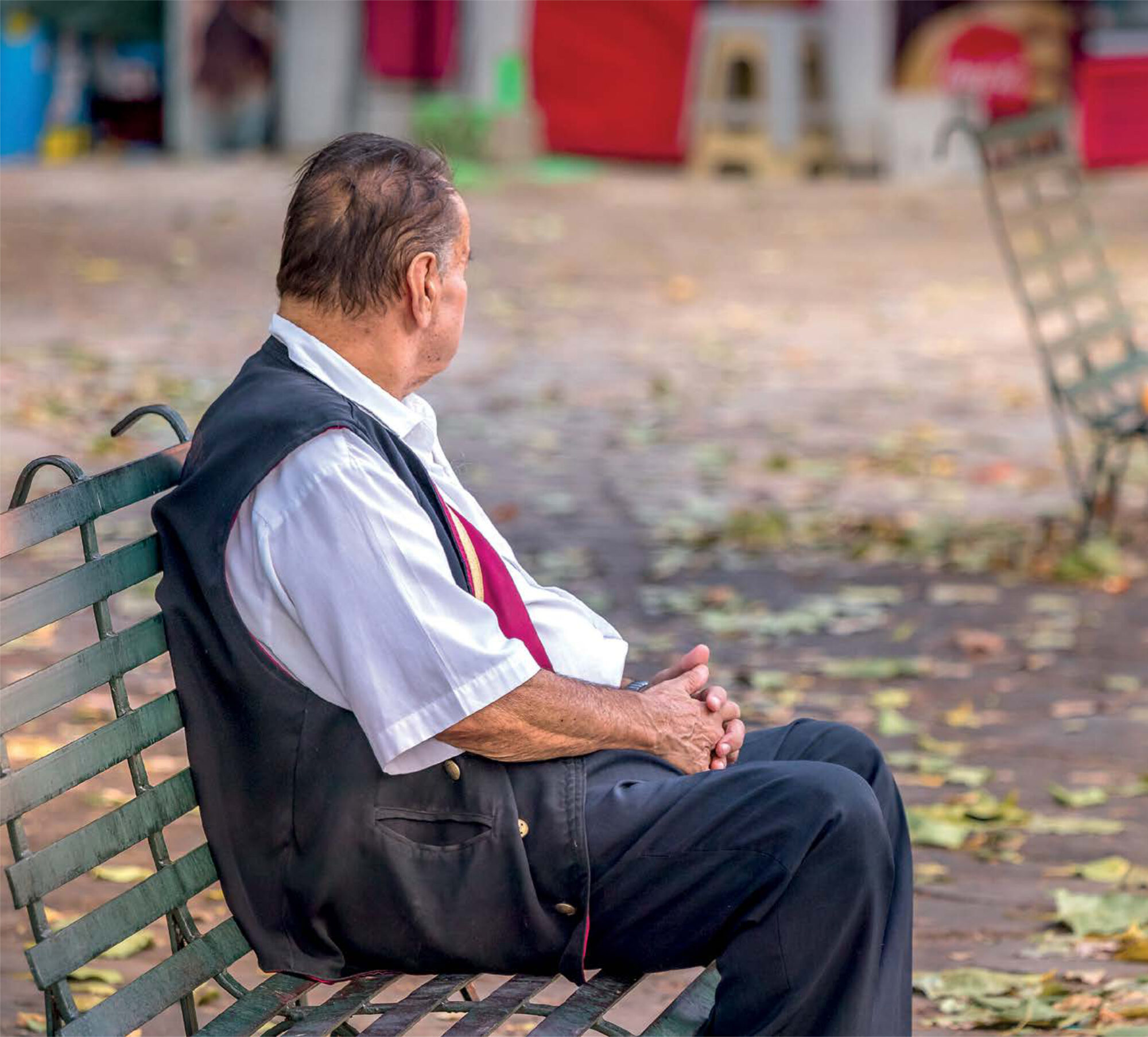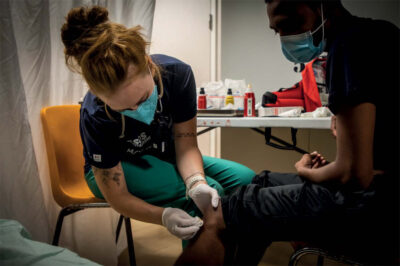Main content
The proportion of the population aged 65 and older worldwide has never been so high and is expected to double over the next three decades.[1] At the same time, the number of older people living outside their country of origin is growing. Against this background, the prevalence of dementia is projected to increase from about 50 million cases in 2018 to 152 million by 2050.[2] This increase is expected to be even sharper in certain ethnic and migrant communities due to the higher prevalence of comorbidities such as diabetes and hypertension as well as the influence of social determinants of health. These unprecedented demographic changes require structural adjustments within health systems to develop and implement inclusive strategies to promote health among ageing and increasingly diverse populations. All of this is taking place in societies with waves of anti-migration rhetoric in which the complexity of migration narratives is reduced to a security issue and in which diversity is considered a threat to society.
Dementia education programmes
Dementia is an umbrella term that refers to a number of cognitive disorders, characterised by a wide variety of symptoms. Symptoms can include memory and language problems and difficulty with planning and executing tasks as well as problems with orientation and behavioural changes. The progression and intensity of the symptoms vary, affecting the daily life of those diagnosed to different extents. It impacts not only the life of the patients but the entire support system around them. As health professionals, we are familiar with this description. Ideally, every individual should be equipped with the knowledge to recognise potential signs of dementia and seek timely medical attention: dementia knowledge helps prevent delays in diagnosis and empowers caregivers to manage their daily responsibilities more effectively.[3]
Over the past decades, researchers and practitioners have developed numerous dementia education programmes. Yet, these are usually tailored for the wider population and may not reach minority groups nor address their specific needs adequately.
Studies conducted within migrant communities, mainly in high-income countries, reveal that older people with a migration background are diagnosed with dementia later than their native peers and at a more advanced stage of the disease, suggesting the need for targeted interventions within these communities, where informal caregivers frequently bear primary responsibility for managing care.[4, 5]
Barriers to care and delay in diagnosis
The concept of “older migrants” is a simplification, referring to a highly diverse group encompassing many ethnicities, languages, and cultural beliefs. Nonetheless, despite differences, there are common challenges that affect access to care for those ageing outside their countries of origin, including communication, financial, and systemic barriers.[6]
Communication barriers arise not only from language differences but also from different health beliefs, which influence symptom interpretation and help-seeking behaviours. For instance, dementia symptoms may be interpreted as a normal part of ageing, delaying diagnosis and exposing family caregivers to a higher risk of burnout. Furthermore, health literacy – which includes the ability to navigate health systems and understand medical information – is often lower among older migrants as they are more likely to have received fewer years of formal education compared to native-born populations.[7]
Regarding financial barriers, older migrants are at greater risk of financial hardship due, for example, to obstacles in accessing pension systems, which can in turn limit access to social and health services.[8]
Additional barriers are “built-in” within health systems that fail to develop and promote culturally sensitive strategies, ranging from culturally validated screening tools and access to interpreters to spiritual and religious support, as well as tailored educational resources for both patients and their caregivers.[9-11]
Promoting dementia knowledge within migrant communities
The literature describes various interventions to promote dementia knowledge among informal caregivers of individuals with dementia from migrant backgrounds. These include in-person educational programmes led by experts, peer-support sessions, and websites providing information in multiple languages.
For example, Van Wezel et al. describe a peer-support group intervention for Turkish and Moroccan caregivers living in the Netherlands held at local mosques and community centres.[12] The authors found that the educational sessions significantly improved participants’ knowledge of dementia (p < 0.001) and were associated with a higher acceptance of support from home-care staff (p < 0.05). Morano and Bravo reported that a 20-hour, face-to-face support programme conducted over five consecutive days among Spanish speaking communities in the US, enhanced caregivers’ knowledge and ability to manage dementia-related challenges (p < 0.05).[13] This intervention provided both theoretical knowledge and practical guidance on personal care techniques and strategies for managing behavioural and psychological symptoms. The authors emphasised the programme’s focus on the needs of culturally diverse caregivers and their provision of free respite care and transportation to participants to enhance participation. Additionally, several online platforms offer culturally tailored educational resources, often co-produced through interviews and focus groups with informal caregivers from minority communities.[14, 15]
Recommendations from the literature
A look at the literature teaches us that culturally tailored interventions are generally effective in improving dementia knowledge and caregiving practices. In turn, dementia knowledge encourages caregivers to seek formal support from home care staff. This increased acceptance of external help contributes to reducing the risk of caregiver burnout.
Factors contributing to the success of interventions are co-creation and engagement of community leaders. The feeling of social isolation is often described by informal caregivers, and peer support, when available, is effective in reducing this, providing emotional relief.
However, the literature also shows that important barriers persist. Misconceptions and stigma around dementia in both caregivers and individuals from migrant backgrounds with dementia are consistently reported, often creating hesitation and reluctance to seek formal support.[16]
Addressing these persistent challenges – such as stigma, language barriers, and access to formal services – requires social and health systems to work collaboratively alongside communities. Involving caregivers in designing educational and supportive interventions, creating peer support networks, and engaging community leaders are essential steps to make care more inclusive and accessible. By prioritising cultural sensitivity and addressing systemic barriers, we can improve the lives of caregivers and, ultimately, those they care for.
References
- United Nations (2020). World Population Ageing 2020. Highlights.
- Patterson C (2018). World Alzheimer Report 2018. The state of the art of dementia research: New frontiers. Published by Alzheimer’s Disease International (ADI), London. Available at: https://www.alzint.org/u/WorldAlzheimerReport2018.pdf
- Teichmann B, Gkioka M, Kruse A, Tsolaki M (2022). Informal caregivers’ attitude toward dementia: The impact of dementia knowledge, confidence in dementia care, and the behavioral and psychological symptoms of the person with dementia. J Alzheimers Dis. 2022; 88(3): 971-984.
- Henderson C, Hodge D, Ethn D, Monteverde R (2021). Delayed dementia diagnosis among older migrants in high-income countries. J Aging Health. 2021 [EB4].
- Nielsen TR, Nielsen DS, Waldemar G (2021). Dementia and minority ethnic caregivers in Denmark. J Alzheimers Dis. 2021; 50(2): 229-239.
- Ahmad F, van den Broeke M, Saharso S, Tonkens E (2020). Access to care for older migrants in high-income countries. Int J Migr Health Soc Care. 2020; 16(4): 251-262.
- Arrieta MI, Jacobs N (2017). Health literacy and health disparities among older migrants. Int J Public Health. 2017. 62(5): 495-502.
- Organisation for Economic Co-operation and Development (2023). Pensions at a glance 2023.
- Beattie BL, Barker JC, Murphy JW, Ross DK (2005). Cultural issues in dementia diagnosis and management. Dementia. 2005; 4(1): 85-93.
- Dilworth-Anderson P, Pierre G, Hilliard TS (2012). Social justice, health disparities, and culture in the care of the elderly. Public Policy Aging Rep. 2012; 22(3): 43-47.
- Franzen C, Vroomen JM, Skarpsno ES, Garcia EM (2021). Cultural sensitivity in dementia care: A review of cultural competence strategies. Geriatr Nurs. 2021; 42(5): 1093-1102.
- Van Wezel N, Hulsebosch R, Pijpers K, Francke AL (2021). Peer-support groups for Turkish and Moroccan dementia caregivers in the Netherlands: Improving dementia knowledge and acceptance of home-care staff. J Transcult Nurs. 2021; 32(3): 279-288.
- Morano CL, Bravo M (2002). A psychoeducational model for Hispanic Alzheimer’s caregivers. Gerontologist. 2002; 42(1): 122-126.
- Ulapane R, Gunawardena N, Karunanayake D (2024). Development of online dementia resources for migrant caregivers through co-production. Int J Migr Health Soc Care. 2024; 20(2): 89-101.
- Pagan-Ortiz ME, Cortes DE, Rudloff N, Weitzman P (2014). Accessing dementia care information through online resources in minority communities. J Community Health. 2014; 39(3): 552-559.
- Ta Park VM, Wiemann C, Fancher TL, Gallagher-Thompson D (2018). Stigma and dementia in minority communities: Barriers to help-seeking. Aging Ment Health. 2018; 22(8): 1020-1026.



















































